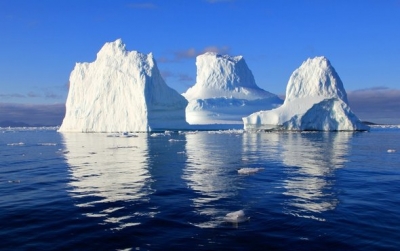
In Antarctica and the Arctic, the oceans freeze because the temperatures are so low. Seawater, unlike fresh water, continues to increase in density as its temperature decreases towards freezing point (about -1.8 ). In fact Antarctica contains 90 per cent of all the ice on the Earth. Scientists have calculated that should all this ice melt, sea levels would rise by 60 m causing world-wide flooding. An accumulation of sea ice can cause an iceberg which floats in the sea because it is less dense than water.
|
Fact File: Over 360 million square kilometres of the Earth’s surface area are covered by oceans and seas, with the Pacific accounting for nearly 36% of the total. |
Picture Credit : Google

